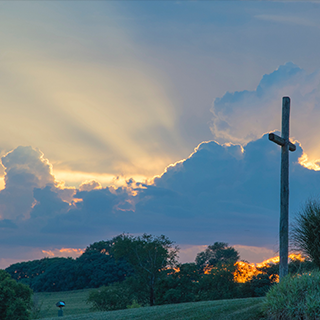Why did an unchanging God create a changing world?
The month of March is filled with change here in Texas. It really does come in as a lion and leave as a lamb—usually. March brings about the changes in the weather I enjoy, but this year it is also bringing about changes in our world. Changing news occurs each day and, recently, each hour of each day.
God told the prophet Malachi, “For I the Lᴏʀᴅ do not change; therefore you, O children of Jacob, are not consumed” (Malachi 3:6). The book of Hebrews tells us, “Jesus Christ is the same yesterday and today and forever” (Hebrews 13:8).
As I watch the news, the weather, the stock market, and the culture, the word unchanging seems irrelevant to almost everything. Why did an unchanging God create a world that seems to constantly change?
God wants us to face forward
Our theme for the month of March comes from the book of Isaiah. God told the prophet, “Remember not the former things, nor consider the things of old. Behold, I am doing a new thing; now it springs forth, do you not perceive it? I will make a way in the wilderness and rivers in the desert” (Isaiah 43:18–19).
The Lord was telling Isaiah to preach the coming changes, including the coming of the Messiah. His covenant with the nation of Israel was going to change at that time. Did an unchanging God change his mind?
The best answer from Scripture is that God doesn’t change his mind; people change and therefore God’s favor and blessings justly respond. God will do all that is best to bring people into a faith relationship with him.
Time has always been moving toward the day that time will end and eternity begins. The changes we see are simply an unfolding of God’s plan and a reminder that he will always have a higher goal for our lives than earthly success and earthly blessings.
The point of life is to face forward and keep moving toward a life that is eternal.
What new thing is God doing today?
Don’t you wish you knew what God has planned for this world? We know the end of the story, but how long is the book? Which chapter are we in?
We have wars and rumors of wars. We have storms, earthquakes, and every sign we have been taught to look for. So did my grandparents. Will we “perceive” Jesus is returning, or will Jesus come back when we least expect it? The answer to both questions is yes. I don’t know when Jesus will return, but I’m certain of this. God is making “a way in the wilderness and rivers in the desert.”
It’s easy to think the problems of this world indicate the return of Christ, but that might not be our indicator. The Jordan River was at flood stage for Joshua, and it was an opportunity for a miracle, not a problem. That is how I am praying for the people of Ukraine these days. I’m asking God to make his reality known through the events I see in the news. I’m asking God to redeem and praying that Putin will be transformed by Christ into a Paul. That is a change that would shout God’s glory to the world.
The power of God is needed, and God’s children need to be praying continuously, with every news report, for every person. Those Russian troops probably have some that know God. What might they do if they are directed and used by God? I’m remembering that a very young David slew Goliath and a very small army took Jericho. Gideon prayed and God answered.
We should be praying David, Joshua, and Gideon-type prayers during these days.
We may never know God’s answers to these prayers, this side of heaven
I want to close with the doxology that ends Paul’s words in Romans 8–11. He spent three chapters trying to help his Jewish brothers and sisters understand there was a new covenant, and, like the Gentiles, they needed to choose Jesus to be their Messiah too.
How did Paul sum up his understanding of the “new thing” God was doing? By telling the church in Rome that God cannot be understood apart from his omniscient power.
Paul wrote:
Oh, the depth of the riches of the wisdom and knowledge of God!
How unsearchable his judgments, and his paths beyond tracing out!
Who has known the mind of the Lord?
Or who has been his counselor?
Who has ever given to God, that God should repay them?
For from him and through him and for him are all things.
To him be the glory forever! Amen. (Romans 11:33–36 NIV)
Why did an unchanging God create a changing world?
We will never fully comprehend God, this side of heaven. God’s judgments are “unsearchable.” We can be certain that we will never understand “the mind of the Lord.” He is Lord and we are not.
So, I close this blog post with biblical truth that will never change. All things are from God. All things work through God, for his perfect plan. And to God be all glory forever.
World leaders will come and go, believing they have earned glory for themselves along the way. The world’s news will change daily. But God holds this world in the palm of his hand and his glory is forever!
We give our unchanging God praise and honor as we watch the changes unfold in our world. We can’t know which chapter of history we are experiencing today but we know how “his-story” ends.
Pray for those who need to move to God’s side to do so today.



